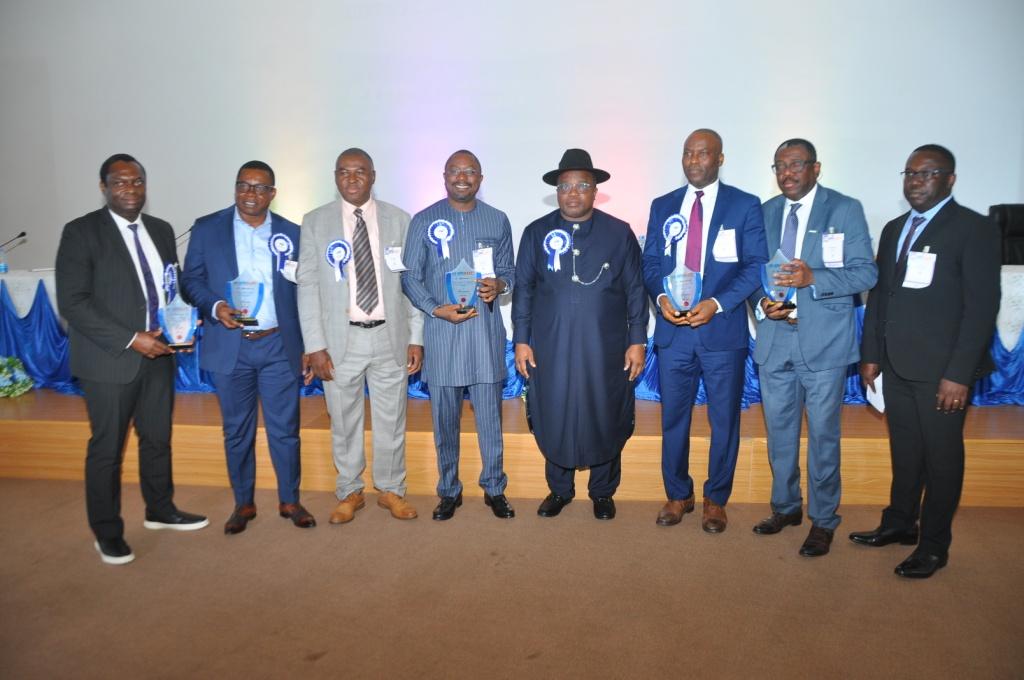It was another gathering of key players in Nigeria’s oil, gas, and energy sector. The event was the 2022 Oloibiri Lecture Series and Energy Forum (OLEF) organized by the Society of Petroleum Engineers (SPE) Nigeria Council. The theme of the Conference is ‘Global Energy Transition: Implications on Future Investments in the Nigerian Oil and Gas Industry. The Petroleum Technology Development Fund (PTDF) yet again played host to the event where topical issues and possible solutions that would help in the development of the oil, gas and energy sector in Nigeria were extensively discussed.
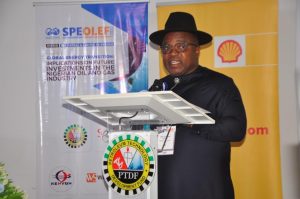 In his welcome address, the Chairman, SPE, Professor Olalekan Olafuyi, stated that the essence of the Forum is to discuss topical issues in the industry that would positively influence government policy direction that would enhance the growth of the industry and the Nigerian economy. He affirmed that the world today is facing a serious energy challenge that requires an all-inclusive approach that could address specific regional problems with their peculiarities. Professor Olafuyi reiterated that the outcome of COP-26 which has created a campaign against fossil fuel funding has been challenged by the recent energy crisis resulting from the Russian invasion of Ukraine. He said, ‘Now is the time for us to formulate frameworks and adopt best practices for the United Nation’s SDG goals addressing affordable and sustainable energy for all and combatting climate change and at the same time maintain the United Nation’s SDGs which are centred around ending poverty and promoting healthy living, which is the essence of our very existence on this planet”.
In his welcome address, the Chairman, SPE, Professor Olalekan Olafuyi, stated that the essence of the Forum is to discuss topical issues in the industry that would positively influence government policy direction that would enhance the growth of the industry and the Nigerian economy. He affirmed that the world today is facing a serious energy challenge that requires an all-inclusive approach that could address specific regional problems with their peculiarities. Professor Olafuyi reiterated that the outcome of COP-26 which has created a campaign against fossil fuel funding has been challenged by the recent energy crisis resulting from the Russian invasion of Ukraine. He said, ‘Now is the time for us to formulate frameworks and adopt best practices for the United Nation’s SDG goals addressing affordable and sustainable energy for all and combatting climate change and at the same time maintain the United Nation’s SDGs which are centred around ending poverty and promoting healthy living, which is the essence of our very existence on this planet”.
The Honorable Minister of State for Petroleum Resources, Chief Timipre Sylva in his Keynote Address stated that the topic of this year’s Forum is apt, especially at a time when the climate change mantra is at the top of the agenda worldwide. He averred that Global Energy Transition was born out of concern for the protection of the environment from the adverse effects of greenhouse gas emissions on the climate. “Climate change is perhaps one of the greatest global challenges of all time, with its grievous impact being felt across the globe. Hence, the need to mitigate the glaring risks of climate change is a global reality”. The Honourable Minister disclosed that Energy is a critical enabler to achieving the seventeen (17) United Nations Sustainable Development Goals (SDGs). He posits that access to affordable, reliable, sustainable, and modern energy is prominently addressed in the 2030 SDG Agenda which is regarded as a fundamental right. According to the Minister, energy sufficiency ensures energy security, which is a very high priority goal for nations all over the globe.
“Energy propels sustainable economic growth. It is a well-known fact that no country can develop without sufficient energy. The implication is that the issues surrounding energy poverty, climate and sustainable development are not mutually exclusive. Consequently, the approach to attending to these issues should not be disconnected. It must be a win-win approach”. He opined that it is misleading to equate energy transition to getting rid of fossil fuels which he sees as being malicious. Chief Silva stressed that it is malicious to give fossil fuels a bad name after most countries have ridden on the backs of the same fossil fuels to develop socially and economically. “Energy transition is about providing clean energy, and not about discriminating between energy sources” he inferred. In the face of the current high level of energy poverty worldwide, the Honourable Minister opined that all energy sources will be required to achieve the SDG energy goal which in his words cannot be achieved by renewable energy resources alone. All available energy resources should be used, while available technologies should be leveraged to make them cleaner”.
The Honourable Minister, who was represented at the Forum by the former Permanent Secretary, Federal Ministry of Petroleum Resources, Dr Nasir Sani Gwarzo, emphasized that Nigeria is still bedevilled with energy poverty. According to him, Nigeria currently has one of the highest rates of energy poverty in the world. Some estimates put it that only about 55% of over 200 million people in Nigeria have access to electricity, while only 13% have access to clean cooking. He, therefore, maintained that Nigeria’s goal should be energy sufficiency to ensure energy security and end the ravaging energy poverty in the country. He asserts that this move is required to drive the nation’s economic growth and end the prevailing economic poverty. “Nigeria needs affordable, reliable and sustainable energy resources to eradicate the prevalent energy poverty in the shortest time possible and propel economic growth”.
The event host and the Executive Secretary, Petroleum Technology Development Fund (PTDF), Dr Bello Aliyu Gusau, in his message to the Forum stated that a recent publication in Energy Information Administration (EIA), projected a nearly 50% increase in the world’s energy use by 2050, led by growth in renewable energy. He opined that although it is envisaged that petroleum and other liquid fuels will surely remain the world’s largest energy source in 2050, renewable energy sources, which include wind and solar will grow to nearly the same level. Dr Gusau asserts that based on this projection, future investments in the Nigerian oil and gas industry may decline due to the global push for clean energy. “Today, Nigeria’s Petroleum Industry contributes approximately 80 per cent of the Federal Government’s revenue and 90 per cent of Nigeria’s export earnings therefore, it has become very important that we start thinking of alternative sources of energy outside the fossil-based system of energy production and consumption (including oil, natural gas, and coal) and pay more attention to renewable energy sources like wind and solar, as well as lithium-ion batteries”.
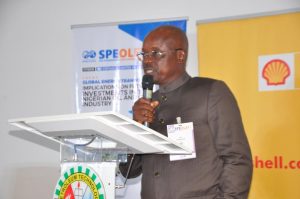 The Executive Secretary, who was represented at the Forum by the General Manager, Strategic Planning and Documentation (SP&D), PTDF, Mr Jide Adebulehin, added that the Energy and Petroleum Industry today is in dire need of technology and skills to increase its viability and profitability. He further stressed that the industry is struggling to recover from the negative effects of the Covid-19 pandemic and amid this slow recovery, it is faced with hikes in oil prices as a result of the current war between Russia and Ukraine. “Ordinarily, the sharp rise in crude oil prices from less than 60 Dollars per barrel last month to as high as 120 Dollars per barrel today is what should benefit the country, but the poor state of Nigerian refineries makes it very difficult to maximize gains as in the case of other oil-producing nations around the world. It is worthy to note that PTDF’s breakthrough research on Zeolite (refining catalyst) development from Kaolin sources is a deliberate and strategic approach to providing solutions to specific industry challenges. Relevant stakeholders are invited to partner with the Fund in the development of a pilot plant for the Zeolite production”.
The Executive Secretary, who was represented at the Forum by the General Manager, Strategic Planning and Documentation (SP&D), PTDF, Mr Jide Adebulehin, added that the Energy and Petroleum Industry today is in dire need of technology and skills to increase its viability and profitability. He further stressed that the industry is struggling to recover from the negative effects of the Covid-19 pandemic and amid this slow recovery, it is faced with hikes in oil prices as a result of the current war between Russia and Ukraine. “Ordinarily, the sharp rise in crude oil prices from less than 60 Dollars per barrel last month to as high as 120 Dollars per barrel today is what should benefit the country, but the poor state of Nigerian refineries makes it very difficult to maximize gains as in the case of other oil-producing nations around the world. It is worthy to note that PTDF’s breakthrough research on Zeolite (refining catalyst) development from Kaolin sources is a deliberate and strategic approach to providing solutions to specific industry challenges. Relevant stakeholders are invited to partner with the Fund in the development of a pilot plant for the Zeolite production”.
The Executive Secretary underscored the importance of capacity building which in his words will continually be at the front burner when it comes to discussions of energy transition in the Nigerian Oil & Gas Industry. He opined that training and development remain the most important enablers which can be used to realize the goals and aspirations of the transition.
He posits that under section I of the PTDF Act, the Fund has the mandate to dedicate, develop, promote, and implement petroleum technology and manpower development through research and training of Nigerians in relevant oil and gas fields. This he said the Fund has done for the past 20 years. The Executive Secretary, therefore, extended an open invitation to anyone who wishes to partner with the Fund in this regard.
While concluding his address, Dr Gusau reaffirms the Fund’s willingness to always associate with the efforts of the Society of Petroleum Engineers in bringing together all stakeholders in the oil, gas, and energy industry to discuss and address topical issues in the industry. He on that note pledged the Fund’s resolve to continuously support and host OLEF and all monthly technical sessions of the SPE which he said have been done for many years without any hitch. “We would like to assure you of PTDF’s unalloyed commitment to continue to support the activities of SPE going forward”.
The first lecture of the Forum was delivered by Mr Osagie Okunbor, Managing Director, SPDC and Country Chair, Shell Companies in Nigeria. His presentation was centred on the theme of the conference. He stated that “energy transition is not an abrupt change from one reality to another, but rather a shift that unfolds generationally over considerable time and one that may lead to greater diversity in the energy marketplace”. He disclosed that the debate on energy transition and the multifaceted challenges and opportunities it presents is one of the most discussed and widely debated topics across the globe today. “I strongly believe that energy transition will be the most transformative event for the society in the coming decades, we definitely cannot discuss the energy transition without asking the question, what happens to fossil fuels? Nigeria is a fossil fuel dependant nation, and therefore must pay attention to all signs”. He opined.
Mr Okunbor however advocated a pathway to what he believes is the just transition which in his view is at the fundamental level that balances equal important objectives of economic development, growth, energy access and environmental sustainability and developing countries like Nigeria should not trade one for the other.
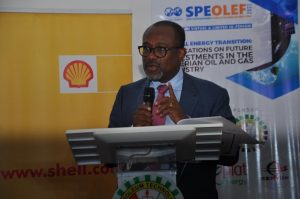 The second lecture of the Forum was delivered by the Executive Secretary, Nigeria Content Development and Monitoring Board (NCDMB). His lecture was also centred on the Conference theme. According to him, the word transition is a misnomer as the world has never really transited completely out of any form of energy. “The outcome I see in the energy transition or energy shift debate is the redistribution of energy mix rather than the outright swap of one form of energy for the other’’. He opined that the various transitions from one form of energy to another have largely been driven by the availability of local resources. In his presentation, Mr Wabote explained that two implications have emerged from the rush to move away from fossil fuel. The first implication is that of divestment case while the second is Energy Shortage Case. The divestment case is his word has brought about a bitter-sweet experience for Nigeria while on the other hand has resulted in the emergence of indigenous oil and gas companies, playing major roles in exploration and production activities in the sector to the extent that companies like Seplat Energy, Eroton Exploration and Production, aiteo, First Exploration & Petroleum Development Company Ltd, etc, have acquired assets and are now responsible for producing about 15 per cent of Nigeria’s oil and gas requirements and then 60 per cent of domestic gas, which in itself is a strategic investment for the survival of the country. He however decried the inability of the IOCs to make further investment in oil and gas which have resulted in the repatriation of capital out of Nigeria which inadvertently, has stifled the nation’s economy in the much-needed foreign exchange funds used as loans to acquire oil and gas assets instead of being used to develop new production assets. The energy shortage case in his view is becoming a new global reality.
The second lecture of the Forum was delivered by the Executive Secretary, Nigeria Content Development and Monitoring Board (NCDMB). His lecture was also centred on the Conference theme. According to him, the word transition is a misnomer as the world has never really transited completely out of any form of energy. “The outcome I see in the energy transition or energy shift debate is the redistribution of energy mix rather than the outright swap of one form of energy for the other’’. He opined that the various transitions from one form of energy to another have largely been driven by the availability of local resources. In his presentation, Mr Wabote explained that two implications have emerged from the rush to move away from fossil fuel. The first implication is that of divestment case while the second is Energy Shortage Case. The divestment case is his word has brought about a bitter-sweet experience for Nigeria while on the other hand has resulted in the emergence of indigenous oil and gas companies, playing major roles in exploration and production activities in the sector to the extent that companies like Seplat Energy, Eroton Exploration and Production, aiteo, First Exploration & Petroleum Development Company Ltd, etc, have acquired assets and are now responsible for producing about 15 per cent of Nigeria’s oil and gas requirements and then 60 per cent of domestic gas, which in itself is a strategic investment for the survival of the country. He however decried the inability of the IOCs to make further investment in oil and gas which have resulted in the repatriation of capital out of Nigeria which inadvertently, has stifled the nation’s economy in the much-needed foreign exchange funds used as loans to acquire oil and gas assets instead of being used to develop new production assets. The energy shortage case in his view is becoming a new global reality.
“The world is coming to the reality that it is important to have a diversification in oil, gas and energy as the world continues to add new rules to the global energy mix to ensure energy security”.
To get more insights from the Forum, the PTDF Digest crew had some conversations with the Chairman, SPE, Professor Olalekan Olafuyi. During the chat, he stated that the government will not outrightly stop the production of hydrocarbon. He however said hydrocarbon production can be done in an environmentally friendly manner to preserve the ecosystem. According to the Chairman, the only way damage to the environment can be combated is by investing in gas infrastructure. “We have a decade of gas master plan and there is already a line been laid even to Europe. So, the government just need to invest, or investors need to come in and preserve the environment by reducing the carbon emission from the fossil fuel to gas because gas is cleaner”.
The Professor opined that it is not only in Nigeria that gas has been declared as a transition fuel but also in the whole world. He stated that it is difficult to fight what is natural. “We did not put any chemical reaction together to get natural gas, it was given to us naturally, so the whole world is clamouring for gas. So, the federal government is doing the right thing, we are on the right direction in making sure that gas is available”.
Also speaking with the PTDF crew, an Executive member of SPE, Engineer Felix Obike, said that the Forum will continue to build on the success of the lecture series towards getting a framework for continuous cleaner energy. He underscored the strategic role of OLEF in policy formulation in the oil, gas and energy industry in Nigeria. “We have the PTDF and the NCDMB to support us. So, the main thing is that we attract the investors, the government, and the policymakers to make sure that at the end of the day we get communiqué that will be followed through by the government”. He asserted.
In his words of gratitude, Engineer Obike thanked the PTDF for the role it has been playing over the years in hosting the Oloibiri Lecture series annually which according to him is as a result of the long-standing relationship that exists between the PTDF and SPE. “It is a long-standing relationship that we have, and it will continue. I believe it is a symbiotic relationship; it is a win-win situation. So, we thank the PTDF as it continues to grant us access to its building”.
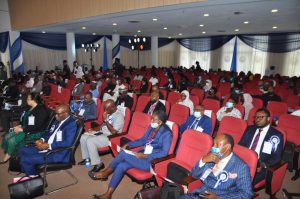 The Oloibiri Lecture Series and Energy Forum is an annual lecture series that is focused on contributing to oil and gas policies development in Nigeria. The Lecture Forum is in commemoration of the first oil well drilled in Nigeria by Shell Darcy at Oloibiri, in Ogbia, Bayelsa State, in 1956. The annual lecture series attracts participation from the government, Heads of industry practitioners at all levels, Regulatory Agencies, as well as other key stakeholders around the globe.
The Oloibiri Lecture Series and Energy Forum is an annual lecture series that is focused on contributing to oil and gas policies development in Nigeria. The Lecture Forum is in commemoration of the first oil well drilled in Nigeria by Shell Darcy at Oloibiri, in Ogbia, Bayelsa State, in 1956. The annual lecture series attracts participation from the government, Heads of industry practitioners at all levels, Regulatory Agencies, as well as other key stakeholders around the globe.

